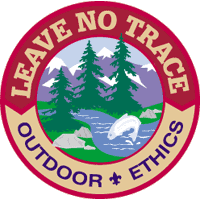______________________________________________________
Outdoor Ethics
7 Principles of Leave No Trace
_________________________
1. Plan Ahead and Prepare
2. Travel and Camp on Durable Surfaces
3. Dispose of Waste Properly
4. Leave what you find
5. Minimize campfire impacts.
6. Respect Wildlife
7. Be considerate of other visitors
Outdoor Code
As an American, I will do my best to
Be clean in my outdoor manners,
Be careful with fire,
Be considerate in the outdoors
and
Be conservation minded.
____________________________________
1. Plan Ahead & Prepare
Things to Know:
It is important to follow this to not waste time going back getting more or less supplies because you packed too little.
PLAN your routes and know which areas are durable & non durable surfaces.
PLAN to make sure your hike doesn’t interfere with horse trails. If it does, stay on the lower side of the hill if it crosses on a hill.
2.Travel & Camp on Durable Surface
Things to Know:
-Durable surfaces are any objects that won’t get damaged (to an extent) after walking on or camping on like rocks, pavement, ect.
-Non-durable Surfaces are any object that do get damaged after camping on like ferns, various flowers, most plants, ect.
-Grass is a durable object because it repairs itself within 1-2 days unlike other plants which takes years or never to repair.
-Plan your trail hikes and campsites according to the location of durable and non-durable surfaces.
-When hiking up/down a hill and there is a road/rail/horse path in the middle, stay on the lower side of the hill so you don’t fall into the path
3. Dispose of Waste Properly
Things To Know:
-Pack it in; pack it out. Whatever you bring with you, all items should be taken with you when you leave.
-Throw personal garbage into a not full trash bag/can.
-Latrines are best ways to dispose of personal chemicals while camping.
-If there are no latrines or bags to bring it out with you, dig in dig a cathole.
-Dig it in preferably dirt, not sand at least 200 feet away from trails, water sources or campsites to avoid contamination, smell, chances someone else will dig in the same spot, and ability for animals to dig it up.
-Depth should 6-8 inches (instead of measuring, you can use the scooping part of a garden shovel to measure the depth).
-Do not toss human/pet poop, or trash into water, urinating directly into a riveris fine depending on local regulations.
-Pack out toilet paper after digging catholes if possible.
-Never urinate on solid ground/rocks. Deer and other animals are attracted to the salt in it.
-When hiking in places you can’t dig catholes (rocky areas), urinating on rocks is ok if the rock is in the sun.
-Used charcoal should be scattered to dispose of it.
-Using biodegradable soap, wash and scatter dish water 200 feet away from water sources.
4. Leave What You Find
Things to Know:
-Leave rocks, plants, and other natural objects there for other’s enjoyment.
-Take nothing but pictures, leave nothing but footprints.
-Consider on local or federal laws against taking a certain species or discovery (it may illegal!!!).
-Make as least damage or alterations to an area as possible.
-Do not cut down trees (it is not good firewood and doesn’t benefit the tree), nail into a tree for hanging things, peel bark off a tree, carve initials, ect.
-Found artifacts on public land is illegal to move or disturb.
5. Minimize Campfire Impact
Things to know:
-ALWAYS use already built and used campfire pits. NEVER make a new pit without the authorization of the sites owner/ranger.
-Standard LNT fuel should never be larger than the length from the end of your middle finger to your elbow and a diameter of an adult’s wrist.
-When finding a new fire pit area, pick a site with mostly level ground, away from any overhead tree branches and not too dry area.
-Do not take firewood/bark from living trees or from logs that could change the enviroment in any way.
-Scatter unused wood and ashes in the woods.
-Do not burn trash.
-Never leave a burning campfire unattended and always have a fire bucket with water readily available
-If you have permission to start a new pit, find an area to under any trees and branches, on roots or in grassy field and make sure you surround the pit with rocks.
6. Respect Wildlife
Things to know:
-If you go into the woods, wear darker color cloths (like browns, greens, navy blues…). Only wear neons, oranges… when you need to be found.
-NEVER leave food about and NEVER feed wild animals. If you do, the animals get depended on humans for food and when you stop giving food, the search for food in people’s houses/trash, towns, and wherever they can get food.
-Be as quiet as you can
-Respect wildlife
7. Be Considerate of Other Visitors
Things to Know:
-Same things as #6
-Don’t wear bright colors when walking by campsites. People enjoy what they are doing and when you walk by in neon, they easily see you at the corner of their eye.
-Don’t litter. It doesn’t look good.
-Try to be quiet. Expecially if people are sleeping
-Always ask permission to enter a campsite
_________________________
External Links:
Teaching Leave No Trace from scouting.org
